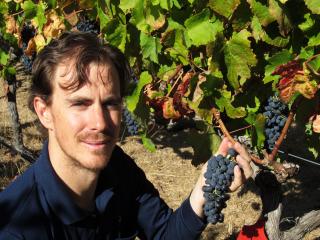A range of Chardonnay and Shiraz wine grape clones are being evaluated in Western Australia as part of a national project identifying differences in fruit and wine quality based on different climatic regions in which the grapes are grown.
The Department of Agriculture and Food is conducting the Western Australian component of the four-year research project led by the South Australian Research and Development Institute (SARDI) and funded by the Australian Grape and Wine Authority (AGWA).
Department viticulture research officer Richard Fennessy said the project was expected to provide management strategies for growers to address the potential negative effects on fruit quality resulting from our changing climate.
“The project will evaluate grape clones from commercial vineyards to identify differences in fruit quality and potential disease tolerance,” Mr Fennessy said.
“The clones are planted in Margaret River and Mount Barker in Western Australia, and in the winegrowing regions of Riverland and Barossa in South Australia and the Grampians and Henty in Victoria.
“Climatic data is currently being collected from each site and field measurements recorded on fruit quality and yield, canopy growth and vigour, and disease susceptibility.
“Wines produced from the trial will undergo a sensory analysis by the Australian Wine Research Institute to assess sensory differences between the clones and the regions where they are grown.”
The sensory assessment involves a panel of trained assessors evaluating the wines based on their appearance, aroma and palate characteristics.
Chardonnay and Shiraz are the two main varieties grown in Australia.
Clones are selected from vines with superior viticultural or wine quality attributes. The superior clones in this national project originate from South Australia, Victoria, Western Australia and France.
Mr Fennessy said most of the clonal work conducted in Australia over the past decade had focused on yields alone.
“Additional information on clones had become vital due to increasing interest in superior Chardonnay and Shiraz clones and their suitability to certain climes and wine styles,” he said.
“The research project is expected to demonstrate to growers that clones influence wine style.
“By comparing the performance of a number of clones in diverse climates and across three consecutive vintages, the trial will characterise how clones perform relative to the climate in which they are grown.
“This information will help growers determine the best-performing clones for their climatic conditions.
“Ultimately, the project will help improve wine quality and profitability, and reduce the impact of climate change on grape and wine production.
“The outcome for consumers of Australian wine will be the availability of consistent and higher-quality wines through the selection of clones shown to produce quality wines when grown in specific climatic conditions.”
Mr Fennessy said new knowledge arising from the research would be shared with growers at regional workshops and field days, and articles in industry publications, and wine growers would have an opportunity to taste wines from the trial.
Department executive director for Irrigated Agriculture John Ruprecht said the research was a good example of the department collaborating with scientists throughout Australia to advance the wine industry.
“This collaborative research is helping address the long-term needs of the viticulture industry in the face of our changing climate, and drive products that enable the industry to be profitable and resilient,” Mr Ruprecht said.

Media contact: Jodie Thomson/Dionne Tindale, media liaison +61 (0)8 9368 3937
